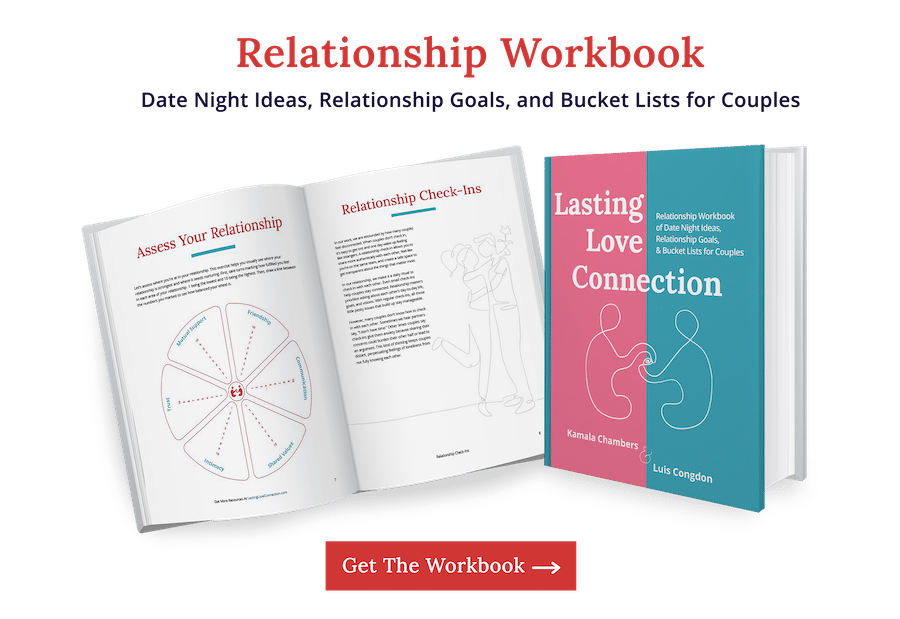Are you looking for new marriage communication tools for couples to strengthen their relationship?
Although communication is often mentioned as a crucial factor for a successful relationship, it is not often accompanied by practical tips and strategies.
This article will discuss common communication challenges couples face and 8 tools for communicating more efficiently in your relationship.
Table of Contents
What causes communication problems in marriage?
First, let’s explore communication issues married couples face.

Lack of listening or understanding
Many couples struggle because one or both partners don’t listen to each other with undivided attention.
When you or your partner are not fully paying attention to when the other is talking, it can lead to misunderstandings and hurt feelings.
Unresolved conflict
Lingering issues in the relationship often create a communication barrier.
If past problems are left unresolved, built-up resentment can block your communication attempts and create distance between you.
Different communication styles
Partners may have different ways of communicating.
For example, one partner may be more aggressive while the other person tends to be more passive.
When these styles clash, it can lead to tension and negative feelings.
Lack of time and attention
Sometimes, communication problems boil down to a lack of time invested in the relationship.
Busy schedules and competing priorities of work and family interfere with spending time with your partner.
When you are together, technology and other distractions can make it so that you’re physically there yet not present with each other.
Over communicating

While healthy communication is essential in relationships, there is such a thing as too much communication.
Though it may seem like the more communication, the stronger the connection, overcommunication has the opposite effect.
When there is over-communication in relationships, it leads to unhealthy relationship dynamics like codependency.
Additionally, overcommunicating can lead to feeling emotionally drained, suffocated, or resentful.
Signs of over-communication include
- Constantly checking in on your partner’s whereabouts.
- Oversharing details of your thoughts, feelings, and experiences without consideration of your partner’s boundaries.
- Having repetitive conversations about the same relationship issues without resolving them.
- Lack of space to process your thoughts and feelings.
Marriage communication tools #1: Process your feelings first

One of the easiest communication traps to fall into is reacting in the heat of the moment and saying something hurtful.
To avoid this pitfall, process your emotions before you bring up an issue with your partner.
Several ways to process your feelings include journaling, meditating, or planning what you want to say in a conversation beforehand.
Taking the time to pause and reflect allows you to get clear about your feelings and express yourself clearly when talking to your partner.
Marriage communication tools #2: Express a positive need
In his decades of work with couples, Dr. John Gottman discovered the importance of framing needs positively.
He found that an attempt to state your needs can come off as a criticism of your partner.
For example, you might say, “I wish you would stop texting when we spend time together.” Your partner will likely receive your words as an attack and become defensive.
On the other hand, stating a positive need keeps the focus on what you would like to happen instead of what you want to stop.
For instance, you could say, “I would love it if we could both be present when talking without distractions.”
When you voice your needs without attacking or blaming, your partner is much more likely to be open to hearing you.

Recommended Communication Tool: The Appreciation Game
Marriage communication tools #3: Practice active listening
Another way to communicate more effectively is by practicing active listening.
When you practice active listening, you give the other person your full attention as they talk.
You show that you are engaged through open body language (like nodding and eye contact).
One helpful active listening skill is paraphrasing your partner’s words to ensure you understand their message.
Marriage communication tools #4: Take responsibility

One of the keys to better communication is being willing to take responsibility for how your actions affect your partner.
When your partner shares a concern with you, you may quickly become defensive and try to deflect blame.
However, reacting this way leads to more tension and conflict instead of de-escalating it.
Acknowledging your partner’s feelings and apologizing for your behavior when necessary allows you to repair the hurt and move forward.
Marriage communication tools #5: Be willing to compromise

In a good relationship, you and your partner are willing to make compromises.
When one partner constantly gets their way, it leads to an imbalanced relationship dynamic, and resentment piles up.
Compromising ensures both partners feel heard and valued.
For example, you want more space over the weekend to pursue your hobbies and visit with friends and family.
However, your partner feels distant from you and wants to spend more time together.
Once you’ve shared your needs and listened to your partner’s point of view, look for a middle ground.
For instance, to accommodate both of your needs, you decide to stay consistent with a weekly date night on Friday, then take time for yourselves on Saturday afternoon.
Marriage communication tools #6: Understand your attachment styles

How we communicate is primarily influenced by our attachment styles.
Our attachment style develops based on our childhood experiences and continues to affect us in adult relationships.
For example, if your partner has an avoidant attachment style, they may avoid conflict at all costs.
When the possibility of conflict arises, it may lead to your partner shutting down or stonewalling you.
They may even walk away from the conversation entirely.
On the other hand, a person with an anxious attachment style is more likely to want to talk things through immediately.
Understanding attachment styles allows you to become aware of your reactions and why your partner behaves like they do.
From there, you and your partner can work together to change unhelpful patterns.
Instead of reacting impulsively, you recognize when you’re overwhelmed and communicate that you need to take a break.
Marriage communication tools #7: Have consistent relationship check-ins
Relationship check-ins allow you and your partner to consistently check in about what’s going on in your relationship.
During this set-aside time, discuss what’s going well in your relationship, what you’d like more of, and any concerns or unmet needs.
Since it can be challenging to bring up relationship problems, check-ins provide a safe space to bring up issues without coming off as an attack.
For a step-by-step guide to successful relationship check-ins, pick up the Relationship Workbook.

Marriage communication tools #8: Seek couples counseling to develop healthy communication skills
To build better communication skills, seek support from a relationship coach.
A relationship coach will help you transform poor communication patterns and develop tools for a loving and healthy relationship.
Book a complimentary couples consultation to learn more about relationship coaching and see if working with us would be a good fit.
How do successful couples communicate?

Successful married couples prioritize honest and open communication. They feel comfortable expressing their thoughts, emotions, and concerns without fear of judgment. Successful couples express themselves clearly and directly, communicating their needs and desires in a way that is easy for the other person to understand.
What makes a strong marriage?

Strong relationships are characterized by effective communication, trust, mutual respect, emotional support, healthy boundaries, physical and emotional intimacy, shared goals, and conflict-resolution skills. In healthy relationships, partners express their needs calmly and respect each other’s perspective.
How can I improve my relationship communication?

Use these practical skills to enhance communication and strengthen connection with your partner: 1.) Practice active listening during conversations. 2.) Use ‘I’ statements. 3.) Instead of becoming defensive, focus on expressing your own feelings and needs. 4.) Express empathy. 5.) Be clear and specific.
How do you fix communication problems?

Fixing communication problems in relationships requires effort, patience, and a willingness from both partners to make positive changes. Have an honest conversation with your partner about your concerns and the changes you want to make to begin communicating more effectively. For support with building better communication patterns, seek out the support of a couples coach to offer a fresh perspective.






0 Comments